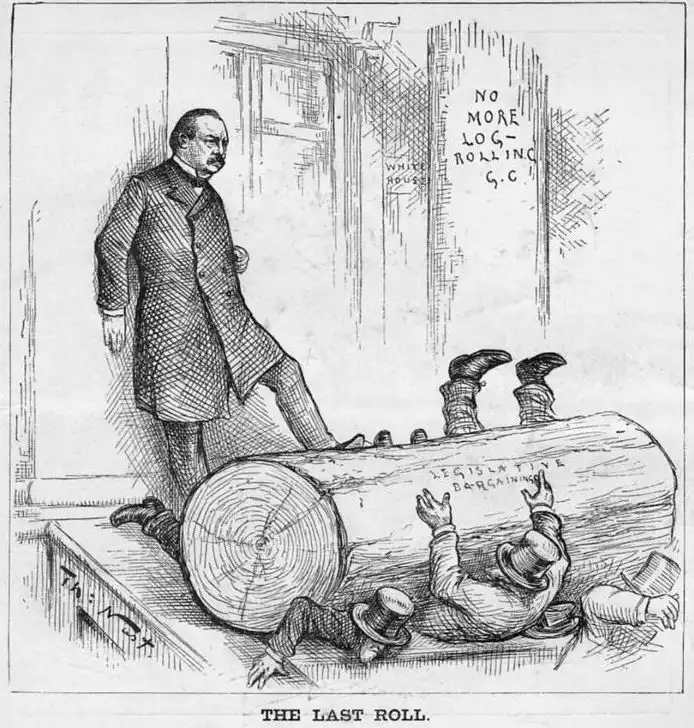Logrolling refers to a quid pro quo exchange of favors.
In politics, it generally refers to vote-trading by lawmakers to ensure that each legislator’s favored provisions have a higher chance of passing.
Specifically, logrolling means combining several provisions into one bill.
Each of the provisions in the bill is supported by just a few members of Congress, and would not be able to pass through Congress on its own. But when the provisions are combined, or rolled together, they can secure a majority vote.
Origin of “Logrolling”
The term grew out of an old American custom in which neighbors helped each other to roll logs into piles for burning.
Logrolling is also an obscure sport in which contestants balance on a log in water and try to make each other fall off.
In politics, logrolling usually comes into play when legislators need votes on a bill that would help out their home districts.
Projects like Federally funded bridges, highways, and hospitals, which benefit people in the district but might be funded by federal taxes, are often pushed through thanks to logrolling.

“Logrolling” has a long history
It can be traced back as far as 1790, when Secretary of State Thomas Jefferson presided over a deal known as the “Compromise of 1790.”
Politicians at the time were struggling to decide how the debts incurred during the Revolutionary War would be paid off.
At the same time, they were trying to reach a deal about where the nation’s capital should be.
Finally, at a dinner party hosted by Thomas Jefferson, Virginia representative James Madison agreed to Alexander Hamilton’s request that the Federal government should take responsibility for the war debt, in exchange for putting the nation’s capital on the Potomac.
President Lyndon Johnson is often described as a master of the technique and of political deal-making.
Johnson was a consummate politician who prided himself on knowing where every lawmaker’s interests were. He was famous for taking to the telephone or buttonholing members of Congress in person in order to trade votes and get his favored legislation through Congress.
In defense of “Logrolling”
The practice — along with earmarking and pork barrel spending — tend to be criticized by good-government groups and by watchdogs.
But some pundits argue that logrolling is just the simplest way to push big, complicated laws through Congress.
They argue that, by its nature, it forces politicians to compromise and to make deals, abandoning more extremist positions in order to find a middle ground.
In 2014, a study found that “backroom deals” and political methods like logrolling could actually be beneficial to government.
The study found that such practices lead to greater understanding among political parties, by forcing them to interact with each other for prolonged periods of time.
The study also found that closed-door meetings lead to more compromise, while increased transparency can lead to political rigidity and posturing.
Use of “Logrolling” in a sentence
- In the heated negotiations over the budget bill, logrolling became an essential tool, as senators traded support for agricultural subsidies in exchange for backing urban development grants.
- Critics argue that logrolling can undermine the integrity of the legislative process, as it often leads to deals that may benefit specific constituencies but lack broad public support or alignment with national priorities.
- The art of logrolling, while sometimes viewed negatively, has facilitated many bipartisan agreements by encouraging compromise and coalition-building, thereby enabling the passage of complex and multifaceted legislation.